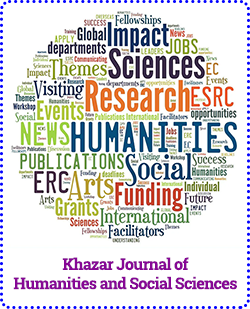The Role of Information Technologies in Developing Future Specialists’ Communicative Competence
DOI:
https://doi.org/10.5782/.kjhss.2023.92.106Keywords:
information technologies, communication, digital technologies, discussion, discourse, digitalization, educational institutionsAbstract
The use of information technologies in developing communicative competence is a research issue, which consists of analyzing the integration of innovative technologies into the educational process. The issue of the quality of organizing the educational process and the possibility of improving future specialists’ practical abilities is an important task for modern educational institutions. The primary purpose of the academic paper is to analyze the role of information technologies in education and their potential application for forming communicative competence, taking into account the format of remote communication, the organization of educational conferences, etc. Analysis of contemporary educational outcomes following the rise in popularity of distance learning, which served as a catalyst for advancing information technologies in education, is a key component of the research. The theoretical and practical principles of developing communicative competence were outlined and its components were characterized using the scientific research methods. The academic paper examines the features of the modern educational process and information technologies used to improve the communicative component, which is one of the tasks of an educational institution. In addition, the research analyzes the current state of educational services and characterizes the key tendencies in using information technologies, taking into account the opportunities for developing communication competence. The implementation of information technologies in the educational process, whether in a traditional or distance learning format, has the potential to improve it in terms of practicality and efficiency. Using information technologies in education remains a priority, but a debatable issue regarding the possibilities of their implementation, the feasibility of application and prospects for development. The obtained research results can become socially useful to improve the educational process and enhance future specialists’ communicative competence.
Downloads
References
- Aitbayeva B.M., Absatova A.D. (2017). ‘Computer technologies as a means of forming students' communicative competence in foreign language lessons’. Actual Problems of Humanities and Natural Sciences, (2-1), 104-106.
- Аkhmedov, B.A., Makhkamova, M.U., Aydarov, E.B., Rizayev, O. B. (2020). ‘Trends in the use of the pedagogical cluster to improve the quality of information technology lessons’. Economy and society, 12(79), 802-804.
- Bataeva, E.V. (2019). ‘Cognitive and Metacognitive Abilities of Learners in the Context of Smart Education’. In Obrazovanie i nauka. Vol. 21. No. 4, pp. 36–59. DOI: 10.17853/1994-5639-2019-4-36-59
- Campbell, L.O., Planinz, T., Morris, K., Truitt, J. (2019). ‘Investigating Undergraduate Students’ Viewing Behaviors of Academic Video in Formal and formal Settings’. College Teaching. Vol. 67. Issue 4, pp. 211–221. DOI: 10.1080/87567555.2019.1650703.
- Chakur, K.S. (2018). ‘A modern scientific interpretation of the concept of “intercultural communicative competence”’. Vestn. RMAT, 1, 103–110
- Gurova, T., Gurov, S., & Moskaliova, L. (2017). ’Innovative technologies in the formation of future English teachers ’intercultural communicative competence’. Sci. and Ed. Issue, 6, 44–50.
- Kalinichenko, E.B., Ivanova, L.M., Razdobarova, M.N., & Lanina, A.V. (2017). ’Information technologies in language education. “The Nibelung Dialogue” as a means of forming students' foreign language communicative competence P.F. Lesgaft’, 5(147), 62–65.
- Kudratilloev, N.A., Akhmedov, B.A. (2021). ’Application of communication-cluster technologies in pedagogical institutions: interactive methods of processing graphic data’. Scientific Progress, 1(5), 191-198.
- Kachmarchyk, S. (2018). Forming professional communication culture of future managers of foreign economic activity by means of interactive technologies (Abstract from PhD in Pedagogical Sciences Thesis). National University of Life and Environmental Sciences of Ukraine, Kyiv
- Meleshchenko, V., Zablotska L., Chernii, L. (2019). ’Innovative Methods of Teaching English for Specific Purposes at Higher Educational Institutions’. Engineering and Educational Technologies. Vol. 7 (3), pp. 85–96.
- Plachynda, T., Herasymenko, L., Pukhalska, G., & Kryzhevska, K. (2019). ’Using Information Communication Technologies in Professional Training of Future Civil Aviation Pilots’. Revista Romaneasca Pentru Educatie Multidimensionala, 11(2), 270-281. https://doi.org/10.18662/rrem/12
- Prendes, P., Castañeda, L., Gutiérrez, I., Sánchez, V. M. (2017). ’Personal Learning Environments in Future Professionals: Not Natives or Residents, Just Survivors’. International Journal of Information and Educational Technology. Vol. 7, pp.172–178. DOI: 10.18178/ijiet.2017.7.3.861.
- Plachynda, T., Herasymenko, L., Pukhalska, G., Kryzhevska, K. (2019). ’Romaneasca pentru Educatie Multidimentionala’, Romanian Journal for Multidimensional Education. Revista Romaneasca pentru Educatie Multidimensionala, Vol. 11 Issue 2, p270-281. doi:10.18662/rrem/129
- Razdobarova, M.N., Ivanova, L.M., Kalinichenko, E.B., & Lanina, A.V. (2019). ’Experimental research of the formation of intercultural communicative competence among students’. European proceedings of Social and Behavioural Sciences, 58, 1103–1111.
- Sitoru, C.R.G. (2018). ’The Application of Storytelling: A Solution to Overcome the Students’ Speaking Problem’. Journal of English Teaching. Vol. 4. No. 1, pp. 27–36
- Valencia, J.A.A, & Benavides, A.F. (2019). ’Using social networking sites for language learning to develop intercultural competence in language education programs’. J. of Int. and intercult. Communicat., 1, 23–42.
- Jiménez, P. (2015). Exploring Students’ Reactions when Working Teaching Materials Designed on their Own Interests. Cuadernos de Lingüística Hispánica, 25, 201-222. Available from:
http://revistas.uptc.edu.co/revistas/index.php/linguistica_hispanica/article/view/3378 - Ochoa, C. (2014) Electronic Engineering Students’ Interactions through Forums in the Virtual Component of a Blended Learning Course. Cuadernos de Lingüística Hispánica, 23, 121- 150. Available from:
http://revistas.uptc.edu.co/revistas/index.php/linguistica_hispanica/ article/view/2343/2272








